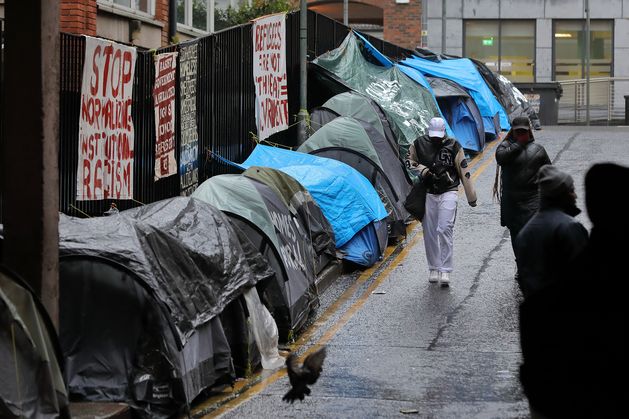World
Hundreds of migrants to be moved out of Dublin as towns for new camps identified

The Government also has plans to open a new asylum-processing centre outside of the capital.
The Irish Independent has learned details of a new Coalition strategy that involves housing hundreds of male migrants in centres in Kerry and Westmeath. Plans to develop the Thornton Hall site in Dublin are included in the plan.
The Government has given the green light to proposals to establish a new International Protection Office (IPO) outside of Dublin and to expand existing migrant camps.
A secret memo reveals the six new camps earmarked to house record levels of asylum-seekers are Columb Barracks in Mullingar, Co Westmeath; Ballymullen in Tralee, Co Kerry; a site in Athlone, Co Westmeath; Thornton Hall in Ballyogan and Crooksling, Dublin.
More than 200 men will be housed at prefab units that will replace tents at the former military barracks in Mullingar.
Capacity at Crooksling will be doubled from the current tally of 180 beds by the end of next month.
Up to 400 men will be housed at a site in Athlone. While 60 Ukrainian refugees are currently housed in Ballymullen, the Department of Integration plans to move them and house asylum-seekers there instead.
Around 100 people are to be housed in Ballyogan in the coming days, with capacity for 390 people at that site.
Asylum-seekers will also be accommodated in Thornton Hall in north Dublin in the coming weeks.
Minor access and sewage works are currently being carried out on the site.
The department is awaiting proposals from providers for tented accommodation.
Officials were also examining a site for migrants in Castlebar, but Mayo County Council has now said it is not available.
More than 10 sites are needed for additional migrant camps in the coming weeks to make sure there is “sufficient supply”, it is understood.
No further sites have been offered to the Department of Integration yet.
A new International Protection Office is to be opened outside of Dublin as the Government aims to shift the focus from the capital.
Hundreds of additional immigration staffers will also be hired as part of a significant ramping up of resources.
Coalition leaders have given Justice Minister Helen McEntee the green light to buy up extra buildings for the IPO and the International Protection Appeals Tribunal (IPAT), since offices at Mount Street and Hanover Street are almost at capacity.
“The Department of Justice is considering additional requirements for office and processing facilities as we continue to scale up the processing of people seeking international protection,” a spokesperson for Ms McEntee said.
“No specific locations have been identified at this stage.”
The extra 400 staff will be put into different stages of the immigration process in a bid to process increasing numbers of international protection applications faster. The Government expects up to 30,000 asylum-seekers to come into the country this year.
IPO staffing is also going to be increased from 490 to 620 and 200 extra panel members will be added by next March. The IPAT will also get an extra 17 tribunal members.
A senior government source said a “further significant ramp-up in resources” had been deemed essential by the Department of Justice to deal with current record numbers and the migrant numbers that are anticipated.
Expected asylum-seeker numbers were “outrunning” the capacity of the immigration processing system and the numbers of cases the Government was dealing with were increasing significantly.
This was why there would be a need for investment at “every stage” of the international protection system, the source said.
People who apply to work for the IPO will be interviewed remotely, initially on a pilot basis this week.
Laws passed before the summer will also broaden the qualification criteria for IPAT panel members and this will aim to further increase capacity in the system
Further measures to speed up the time it takes to process applications are being considered by the Department of Justice.
Ms McEntee is due to make a decision on it by the end of next month because there is a consultation process under way.
The Government also wants to ramp up removals and deportations of people who are unsuccessful in claiming asylum.
Significant garda resources will be freed up to focus on removals of migrants.
This will be done by further increasing the authorised staff in the Immigration Service Delivery Registration unit from 71 to 127 by next year.
The authorised staff on the Repatriation Unit is also to be increased from 72 to 199 by next year.
The number of deportation orders issued so far this year has increased by 51pc on the same period last year and enforced deportations have increased by 178pc.
Voluntary returns, where people who are refused asylum leave Ireland of their own accord, have increased by 128pc compared to the same period last year.
The Government has already sped up processing from a number of different countries, including the one with the most applicants – which is currently Nigeria – as well as designating 10 countries as being “safe countries of origin”.
Applicants who have status in other European countries have also had their asylum application processing sped up.
Applications have halved in number from the original eight countries that were designated as “safe”.










